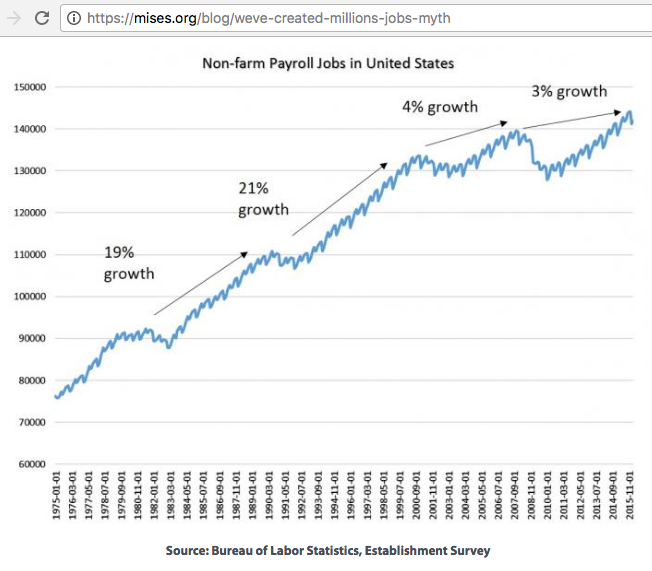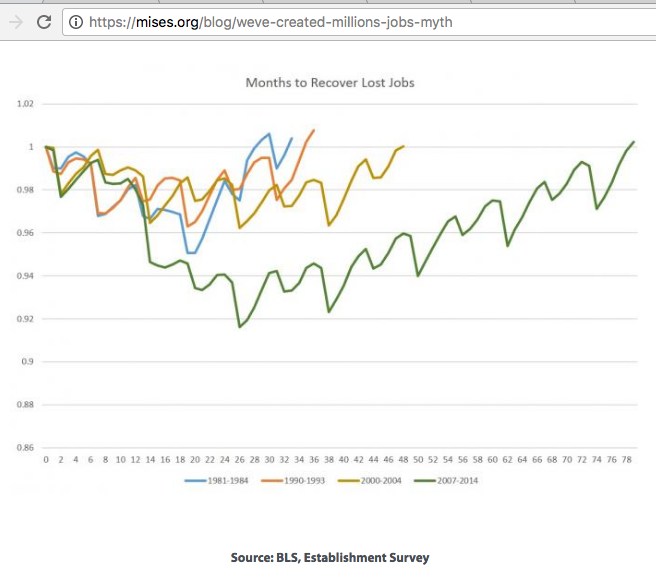Obama U.S. Economic Recovery was Americas Weakest
By Eric Zuesse.
washingtonsblog.com
Eric Zuesse
The following graph of Non-farm Payroll Jobs in United States” shows Americas economic recoveries from recession, in numbers of jobs, and indicates very clearly that ever since the peak in 2000, the two recoveries (G.W. Bush, and Obama) have been far less than before; they were only 4% during the G.W. Bush recovery from the Clinton dot-com crash, and 3% during the Obama recovery from the G.W. Bush real-estate crash. This compares with a far higher 21% gain following the G.H.W. Bush slump, and a 19% gain after the prior, the Carter, post-Vietnam-War crash. Both Reagan and Clinton had better results than did Obama.

The opposite side of this coin is the greatly increased sluggishness of the two post-2000 recoveries, especially Obamas:

This has been a summary of an excellent 15 March 2017 article by Ryan McMacken at the libertarian von Mises Institute blog, titled The Weve Created Millions of Jobs Myth .
McMacken, being a libertarian, wasnt interested in what types of jobs those were, or the pay of those jobs (because libertarians are uninterested in the distributions of income, and of wealth or of anything, including jobs ). However, as has been well-publicized, the distribution, of both wealth and income, has become far more heavily skewed toward the high end after 2000 than it was prior, and the U.S. economy has been hollowed-out so that wages are now flat or going down in the post-2000 U.S. economy, and economic opportunity for people in the lower half is declining, while economic opportunity for the top 5% has been soaring. (Maybe well end up with a world in which there are a few trillionaires, plus millions of robots, and billions of impoverished people who survive as zombies.) A progressive prefers equality of opportunity, and so is disturbed by such gross inequalities, which vastly exceed any natural differences, but a libertarian ignores inequity and simply trusts in the justice of the market. However, at the time when Americas economy was at its peak, both in growth and in distributional equity, which was 1975-1980, the U.S. economy was much more resilient, and more able to recover quickly from slumps, than it has since become. There is a positive association between equity and growth in economics (they increase together, as shown here and here), even though libertarians ignore it and often go so far as to assume a negative correlation between equity and growth (thereby justifying their obsession with only growth). The post-2000 governmental money-funnel, from the masses to the classes, has actually stifled not promoted economic growth in the U.S., just as those studies (the here and here ) indicate has happened throughout the world. Thats empirical economic data (worldwide, not just in the U.S.). But economic theory upon which libertarianism is based ignores such data, because these data are inconvenient for the theory. Data that disprove the aristocracys ideology that disprove that a persons worthiness is measured by his or her net worth (wealth or poverty), and that therefore disprove that the most effective way to increase per-capita GDP or a nations economic success is to treat everybodys dollars as being equal in terms of personal welfare and not only in terms of interpersonal trade; i.e., that disprove that the interpersonal distribution of wealth does not matter and has no effect on or does not affect the nations per-capita GDP such economic data have no impact on, and do not significantly extent affect, economic theory. A new book, Democracy in Chains: The Deep History of the Radical Rights Stealth Plan for America, has just been published by historian Nancy MacLean and is summarized by columnist George Monbiot in the July 19th Guardian; it describes the rape (or prostitution, at least) by American billionaires after World War II, of the economics profession, and of the Nobel prizes in economics, so as to keep economic theory this way (which it has actually been ever since at least the 1700s, laissez faire ).
Anyway, since 2000, both growth and its distribution have performed poorly in the U.S., and this has been a bipartisan, Republican and Democratic Party, economic failure.
Investigative historian Eric Zuesse is the author, most recently, of Theyre Not Even Close: The Democratic vs. Republican Economic Records, 1910-2010, and of CHRISTS VENTRILOQUISTS: The Event that Created Christianity.
View the original article at Washingtons Blog
Source Article from http://feedproxy.google.com/~r/DarkPolitricks/~3/_VNFLfciSPM/
Views: 0
 RSS Feed
RSS Feed

















 July 24th, 2017
July 24th, 2017  Awake Goy
Awake Goy  Posted in
Posted in  Tags:
Tags: 
















